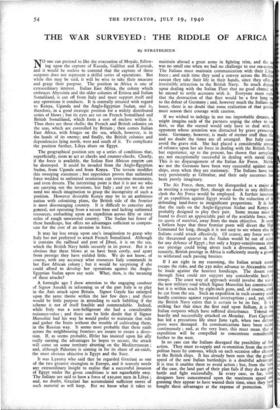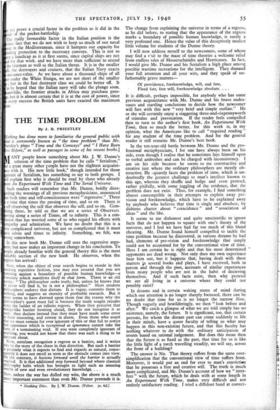THE WAR SURVEYED : THE RIDDLE OF AFRICA
By STRATEGICUS
NO one can pretend to like the evacuation of Moyale, follow- ing upon the capture of Kassala, Gallibat and Kurmuk, and it would be useless to contend that the capture of these outposts does not represent a skilful series of operations. But while this may be said, it will be wise to take their measure and grasp their purpose. The position in Africa is one of extraordinary interest. Italian East Africa, the colony which embraces Abyssinia and the older colonies of Eritrea and Italian Somaliland, is cut off from Italy and must support itself and any operations it conducts. It is centrally situated with regard to Kenya, Uganda and the Anglo-Egyptian Sudan, and is, therefore, in a good strategic position for a widely distributed series of blows ; but its eyes are set on French Somaliland and British Somaliland, which form a sort of enclave within it. Thus there are three shells: the French and British colonies on the seas, which are controlled by Britain ; then comes Italian East Africa, with fringes on the sea, which, however, is in the hands of its enemy; and finally, the British colonies and dependencies lying north, west and south of it. To complicate the position further, Libya abuts on Egypt.
The geographical position sets up a series of conditions that, superficially, seem to act as checks and counter-checks. Clearly, if the force is available, the Italian East African empire can be destroyed. It could be invaded from the Anglo-Egyptian Sudan, from Uganda and from Kenya. The terrain modifies this sweeping statement ; but experience proves that unlimited force wedded to unlimited resolution can overcome mountains, and even deserts. The interesting point is that it is not we who are carrying out the invasions, but Italy ; and yet we do not need too much imagination to grasp the incongruity of such a position. However desirable Kenya may be to an ambitious nation with colonising plans, the British side of the frontier is most discouraging country. It is difficult to conceive any general, not operating from a secure base and lacking unlimited resources, embarking upon an expedition across fifty or sixty miles of rough unwatered country. The Sudan has fewer of these handicaps, but offers no advantages sufficient to compen- sate for the cost of an invasion in force.
It may lay less strain upon one's imagination to grasp why Italy has not preferred to attack French Somaliland. Although it contains the railhead and port of Jibuti, it is on the sea, which the British Navy holds securely in its power. But it is obvious that these blows at us have been costly, and apart from prestige they have yielded little. We do not know, of course, with any accuracy what resources Italy commands in her East African colony ; but it would be surprising if she could afford to develop her operations against the Anglo- Egyptian Sudan upon any scale. What, then, is the 'meaning of these attacks?
A fortnight ago I drew attention to the engaging candour of Signor Ansaldi in informing us of the part Italy is to play in the Axis attack upon Britain. Signor Gayda has enlarged upon the same theme within the last few days ; and there would be little purpose in attending to such babbling if the scheme is not of itself feasible and commendable. Indeed, while Italy was a non-belligerent she had a considerable nuisance-value ; and there can be little doubt that if Signor Mussolini had his way he would prefer to maintain that role and gather the fruits without the trouble of cultivating them, in the Russian way. It seems most probable that these raids across the neighbouring frontiers are meant to create a diver- sion. If, as seems probable, Hitler has insisted upon his ally really earning the advantages he hopes to secure, the attack will come on some territory abutting on the Mediterranean ; and, although Palestine is coming in for its share of air-raids, the most obvious objective is Egypt and the Suez.
It was Lyautey who said that he regarded Graziani as one of the two greatest strategists in Europe, and it scarcely needs any extraordinary insight to realise that a successful invasion of Egypt under the given conditions is not remarkably easy. The Italians are said to have a force of 250,000 men in Libya ; and, no doubt, Graziani has accumulated sufficient stores of such material as will keep. But we know what it takes to maintain abroad a great army in fighting trim, and the was no small one when we had no challenge to our sea-con The Italians must maintain communication with their Lib force ; and each time they send a convoy across the Medit ranean they take their life in their hands, since they offer irresistible attraction to the British Navy. So much depe upon dealing with the Italian Fleet that no good chance be missed to settle accounts with it. Everyone must re that the destruction of that fleet would be a first long to the defeat of Germany ; and, however much the Italians boast, there is no doubt that some realisation of that positi must season their courage with caution.
If we wished to indulge in not too improbable dreams, might imagine each of the partners urging the other to s first, so that the second would only have to deal with opponent whose attention was distracted by grave preoccu tions. Germany, however, is made of sterner stuff than and no doubt the times are all arranged. But Italy can avoid the grave risk. She had placed a considerable amo of reliance upon her air force in dealing with the British Na but experience, up to the present, has shown that aeropl are not exceptionally successful in dealing with naval shi This is no disparagement of the Italian Air Force. Nei we nor the Germans have been very successful against na ships, even when they are stationary. The Italians have tri very persistently at Gibraltar, and their only successes ha been purely imaginary.
The Air Force, then, must be disregarded as a major in meeting a stronger fleet, though no doubt in any delibe clash the Air Force would be employed. A further insura of an expedition against Egypt would be the reduction of defending land-force to insignificant proportions. It is h that the raids on the Anglo-Egyptian Sudan and Kenya probably designed to play their part. Some means must found to divert an appreciable part of the available force, wi its quota of materiel, away from the main objective. It see a forlorn hope that these frontier posts will divert the Hi Command for long, though it is not easy to see where else Italians could attack effectively. Of course, any force sent the threatened quarter in the Sudan would be out of am for any defence of Egypt ; but only a hyper-sensitiveness abo our prestige could bring about such a diversion, and, for tunately, British prestige in Africa is sufficiently sturdy a gro to withstand such passing breezes.
If I am right in my reasoning, the Italian attack ca escape the risks, and the 25o miles advance to Alexandria m be made against the heaviest handicaps. The desert ro through Siwa could not support any considerable body troops. The coast way of approach would involve the use the new military road which Signor Mussolini has constructed but it is within reach by eight-inch guns, and, of course, co be cut from the sea. Such an expedition in such country co hardly continue against repeated interruptions ; and, yet, w the British Navy exists that is certain to be its fate. It is striking fact that since the first raid upon Sollum, it is Italian outposts which have suffered disturbance. Tobruk v, heavily and successfully attacked on Monday. Fort Capru has led a precarious life since June z4th, when two defe posts were damaged. Its communications have been raid continuously ; and, at the very least, this must mean that expedition will be compelled to concentrate considerable further to the west.
In no case can the Italians disregard the possibility of fl action. They must re-supply and re-munition from the me politan bases by convoys, which on each occasion offer than to the British ships. It has already been seen that the great speed of the new Italian battleships is a doubtful advan!age- It is true it enables them to avoid action ; but, from the fats of the case, the land part of their plan fails if they do not gi battle and fight successfully. In every case, so far, who designers have concentrated upon the maximum speed and gunning they appear to have wasted their time, since they ha' bought these advantages at the expense of protection. y yet prove a crucial factor in the problem as it did in the tter of the pocket-battleship.
he really favourable factor in the Italian position is the ions fact that we do not wish to keep so much of our naval 'er in the Mediterranean, since it hampers our capacity for eliding protection to the necessary convoys. This is not so ve a handicap as it at first seems, since capital ships are not for that work. and we have more than sufficient to attend the German as well as the Italian threat. It is in the smaller the destroyers and cruisers, that the Italian Navy exacts nuisance-value. As we have about a thousand ships of all under the White Ensign, we are not short of the smaller ; but in the fast destroyer class we could be better off. It to be hoped that the Italian navy will take the plunge soon. eansvhile, the frontier attacks in Africa may purchase pres- , but it is almost certain that it is at the cost of power, since every success the British units have exacted the maximum ce.



































 Previous page
Previous page